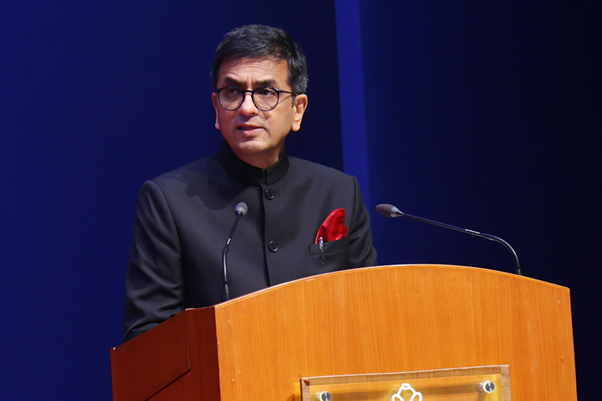India’s Criminal Justice Evolution: CJI Chandrachud Highlights Shift with New Laws
(Judicial Quest News Network)
Chief Justice of India, D.Y. Chandrachud, praised the recent enactment of three new criminal laws, noting that they signal a “Clear Indication” of India’s ongoing transformation.
In his inaugural remarks at the conference on “India’s Progressive Path in The Administration of The Criminal Justice System, the CJI said that by way of the new laws, “much needed improvements have been introduced to protect the victim interest and carry on the investigation and prosecution of offences efficiently.
Union Law Minister Arjun Ram Meghwal, Attorney General R. Venkatramani and solicitor general Tushar Mehta were also present at the conference
The CJI remarked that these laws represent a significant step forward, ushering in a new era for India’s criminal justice framework.
The newly enacted criminal laws have transformed India’s criminal justice framework, ushering in a new era.
These laws introduce much-needed reforms to better protect victims’ rights and streamline the investigation and prosecution of criminal offenses. The BNSS, one of these new laws, adopts a comprehensive approach to addressing crimes in the digital age.
It mandates audio-visual recording of searches and seizures, and requires the presence of a forensic expert at crime scenes where offenses carry penalties exceeding seven years of imprisonment.
This audio-visual recording serves as a crucial resource for prosecutors and as a safeguard for citizens’ civil liberties, while judicial oversight helps ensure that procedural violations during searches and seizures are prevented.
The CJI told the gathering at the conference organised by the Union Ministry of Law and Justice, that “while we make strides in this direction, we must now confront the challenges of fulfilling the aims of the new criminal legislations.
Detailed rules need to be formulated on the type of devices to be used for recording, incorporating the principles of natural justice and lay down the consequences of not carrying out such recordings.
He further said that while the new criminal laws create provisions which are synchronised to our times, we must also ensure that the infrastructure accompanying these procedures are developed adequately for the country to reap the benefits of the new laws.
This naturally means that we must heavily invest in capacity building of our forensic experts, conduct training investigating officers, and invest in our court system. Key provisions of the new criminal law would only produce a positive impact if these investments are made as soon as possible.
CJI also stressed on the urgency of the investment in the infrastructure of India’s criminal justice system. Elaborating, by e said that there is a need for the necessary infrastructure to be in place so that our country can fully benefit from the changes brought by the new criminal laws.
He further said that by sharing how Bhartiya Nagarik Suraksha Sanitha, 2023, (BNSS) provides that the criminal trails should be completed within three years and judgements must be delivered within 45 days of reserving.
While referring the 248th report of the standing committee of the Rajya Sabha on Bharatya Sakshya Samitha CJI said our laws need to address these concerns and obviate age old issues like delays in examination of witnesses, conclusion of trials, overcrowding of prisons and the issue of undertrial prisoners. The 248th Report of the Standing Committee of the Rajya Sabha on the Bharatiya Sakshya Samhita of 10 November 2023 noted that the Indian criminal justice system has struggled to keep pace with the profound technological changes our socio- economic milieu that have radically re-imagined the way in which crimes manifest in the society. The growing scope of technology and new age crime which use the digital landscape to create networks of collaborative units to commit crimes cannot be pinned to an investigative situs. This has presented challenges in investigation of crimes, admission of evidence and prosecution as well as justice delivery.
In the digital age, the data and sensitive information of person’s has gained paramount importance. This data can allow us to gain unparalleled efficiency and ease. However, the power which comes with personal data puts a corresponding duty to make systems which are immune to penetration and leakage of the data.
Concluding his speech the CJI said our laws and their enforcement are constantly evolving. He highlighted the importance of positive changes that align with the needs of our society.
I expect that with the implementation of the new criminal laws, we will discover loopholes and areas which need to be addressed.
Such debates would be helpful in enhancing the efficiency of our criminal justice systems.
However, the ideological framework at the heart of our analysis must be justice oriented with a civil liberty centric approach which balances the interests of the victim and the accused.



